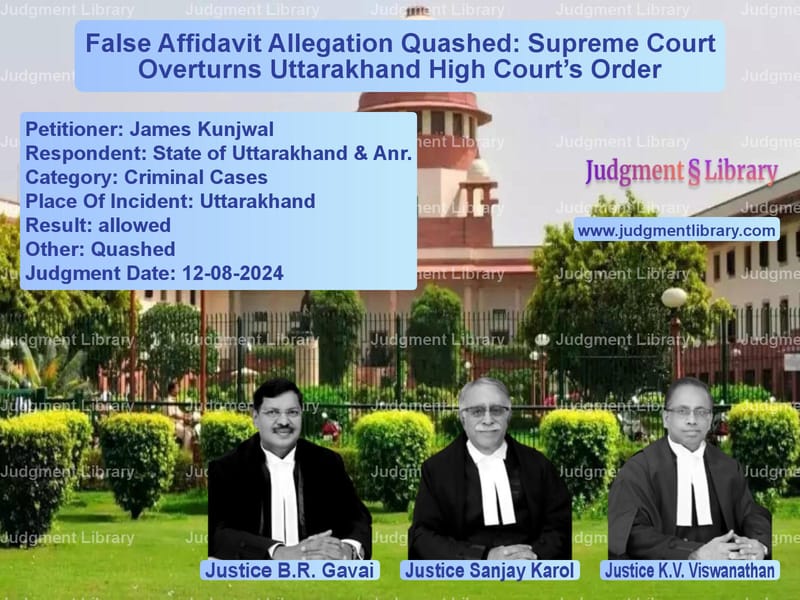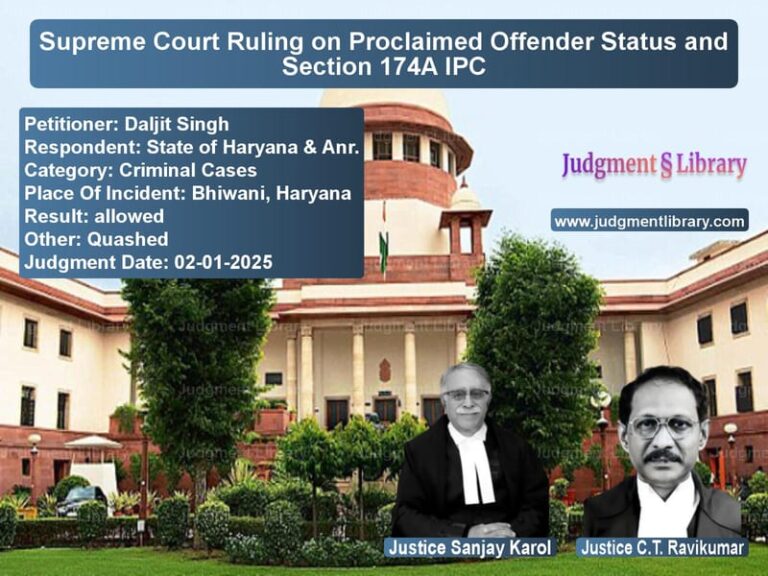False Affidavit Allegation Quashed: Supreme Court Overturns Uttarakhand High Court’s Order
The case of James Kunjwal v. State of Uttarakhand & Anr. revolves around a false affidavit allegation made against the appellant during a criminal trial. The Supreme Court was asked to determine whether the appellant’s alleged conflicting statements in an affidavit constituted an offence under Section 193 of the Indian Penal Code (IPC). The Court ruled in favor of the appellant, setting aside the High Court’s order that had directed the filing of a criminal complaint against him for perjury.
The case stemmed from an FIR filed against the appellant under Sections 376 and 504 IPC, alleging that he had engaged in a relationship with the complainant under false promises of marriage. The appellant had obtained bail from the High Court, but the complainant later sought cancellation of the bail order. While dismissing the bail cancellation plea, the High Court observed that the appellant had intentionally filed a false affidavit and directed the Registrar to initiate legal proceedings under Section 193 IPC. The Supreme Court found that the allegations of perjury were baseless and ruled in favor of the appellant.
Background of the Case
Facts Leading to the Dispute
- On May 2, 2021, an FIR was filed against the appellant by the complainant under Sections 376 and 504 IPC, alleging that he had engaged in a sexual relationship with her under the false pretext of marriage.
- The appellant applied for bail before the Additional District and Sessions Judge, Nainital, but his plea was rejected.
- Subsequently, he approached the High Court of Uttarakhand, which granted him bail on June 8, 2021.
- The complainant filed an application seeking cancellation of the bail, alleging that the appellant had made contradictory statements in different affidavits submitted before the court.
- The High Court, while dismissing the bail cancellation plea on October 1, 2022, made an adverse observation against the appellant, concluding that he had deliberately filed a false affidavit.
- The High Court directed the Registrar to file a criminal complaint against the appellant under Section 193 IPC for perjury.
Legal Issues Raised
Appellant’s Arguments
The appellant challenged the High Court’s decision on the following grounds:
- Mere denial of allegations in an affidavit does not constitute perjury.
- The court is not bound to initiate perjury proceedings unless it is expedient in the interest of justice.
- The alleged contradictory statements were merely defenses raised by him and not deliberate falsehoods.
- There was no conclusive evidence proving that his statements were intentionally false or misleading.
- The High Court exceeded its jurisdiction by ordering criminal proceedings without a detailed inquiry.
Respondents’ Arguments
The State of Uttarakhand and the complainant argued that:
- The appellant had made misleading statements in an attempt to influence judicial proceedings.
- The contradictions in his affidavit indicated that he was attempting to suppress facts.
- The High Court was justified in ordering a perjury complaint to ensure that litigants do not submit false statements to mislead the judiciary.
- Perjury undermines the administration of justice and must be strictly dealt with.
Supreme Court’s Observations
The Supreme Court examined the legal provisions related to perjury and concluded:
- Under Section 193 IPC, false evidence must be intentional and made in a judicial proceeding.
- A mere denial of allegations in an affidavit cannot be equated with deliberate falsehood.
- Perjury proceedings should be initiated only in exceptional cases where the false statement materially affects the administration of justice.
- There must be clear evidence that the false statement was made knowingly and with malicious intent.
- The prosecution for perjury should not be initiated casually or routinely but only when it is expedient in the interest of justice.
Legal Precedents Considered
The Court referred to several landmark judgments on perjury, including:
- Iqbal Singh Marwah v. Meenakshi Marwah (2005) – The Supreme Court held that courts must exercise caution before initiating perjury proceedings and should do so only when falsehood is apparent beyond doubt.
- Chajoo Ram v. Radhey Shyam (1971) – The Court ruled that prosecution for perjury should be sanctioned only when there is clear and deliberate falsehood affecting the administration of justice.
- R.S. Sujatha v. State of Karnataka (2011) – The Court emphasized that perjury proceedings should be initiated in exceptional circumstances.
Final Judgment
The Supreme Court ruled that:
- The direction of the High Court to register a perjury complaint against the appellant was set aside.
- All proceedings arising from the High Court’s order stood quashed.
- The ruling would not affect the ongoing trial of the appellant under IPC Sections 376 and 504.
This ruling reaffirms the principle that perjury proceedings should not be initiated lightly and must be backed by strong evidence. It protects individuals from being subjected to criminal proceedings based on mere allegations and ensures that courts exercise restraint while invoking perjury provisions.
Petitioner Name: James Kunjwal.Respondent Name: State of Uttarakhand & Anr..Judgment By: Justice B.R. Gavai, Justice Sanjay Karol, Justice K.V. Viswanathan.Place Of Incident: Uttarakhand.Judgment Date: 12-08-2024.
Don’t miss out on the full details! Download the complete judgment in PDF format below and gain valuable insights instantly!
Download Judgment: james-kunjwal-vs-state-of-uttarakhand-supreme-court-of-india-judgment-dated-12-08-2024.pdf
Directly Download Judgment: Directly download this Judgment
See all petitions in Fraud and Forgery
See all petitions in Bail and Anticipatory Bail
See all petitions in Judgment by B R Gavai
See all petitions in Judgment by Sanjay Karol
See all petitions in Judgment by K.V. Viswanathan
See all petitions in allowed
See all petitions in Quashed
See all petitions in supreme court of India judgments August 2024
See all petitions in 2024 judgments
See all posts in Criminal Cases Category
See all allowed petitions in Criminal Cases Category
See all Dismissed petitions in Criminal Cases Category
See all partially allowed petitions in Criminal Cases Category







